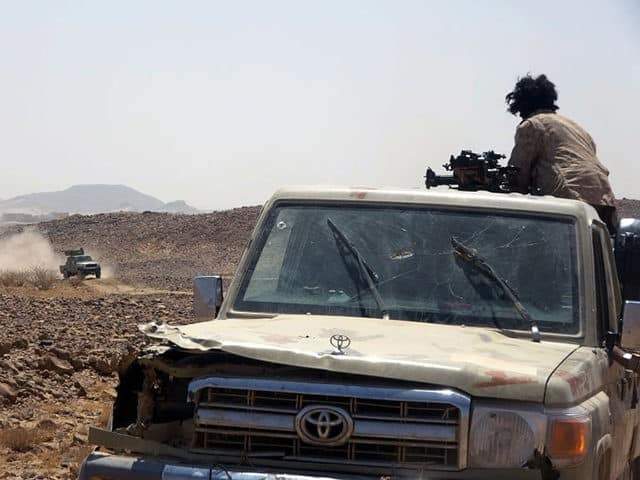Yemen’s Houthis, Delisted as Terrorists by Biden, Bomb Saudi Oil Industry

Yemen’s Iran-backed Houthi insurgents launched a major attack on the oil infrastructure of Saudi Arabia on Sunday, sending a swarm of missiles and armed drones to attack a vital Saudi Aramco facility.
The Saudi government said the attack was repelled without casualties or serious damage.
“Such acts of sabotage do not only target the Kingdom of Saudi Arabia, but also the security and stability of energy supplies to the world, and therefore, the global economy,” the Saudi energy ministry said of the attack, which prompted a spike in worldwide oil prices Monday.
The Houthis claimed responsibility for the strike and said they attacked military targets in three Saudi cities in addition to the civilian oil facility, describing their apparently thwarted strike as a “broad joint offensive operation” that involved 14 drones and eight ballistic missiles. The Houthis claimed the attack was successful and “precise” despite reports of zero damage and zero casualties.
Bloomberg News described the attack as “the most serious against Saudi oil installations since a key processing facility and two fields came under fire in September 2019, cutting production for about a month and exposing the vulnerability of the kingdom’s petroleum industry.”Bloomberg’s description of the attack suggested a deliberate effort to cause civilian casualties in addition to damaging Saudi oil exports:
On Sunday, the Saudi Energy Ministry said an oil storage tank farm at the Ras Tanura export terminal on the country’s Persian Gulf coast was attacked by a drone from the sea. Shrapnel from a missile also landed close to a residential compound for employees of national oil company Saudi Aramco in Dhahran. The compound is home to families of Saudi and expat employees, and there’s a U.S. consulate nearby.Witnesses in the coastal city of Dhahran, where Aramco is also headquartered, reported an explosion rocking the city, and windows shaking. Ras Tanura is about an hour by car up the coast.[…]Ras Tanura is the world’s largest oil terminal, capable of exporting roughly 6.5 million barrels a day — nearly 7% of oil demand — and as such is heavily protected. The port includes a large storage tank farm where crude is kept before it’s pumped into super-tankers. A refinery at the same site is Aramco’s oldest and largest.
The Jerusalem Post on Monday suggested the attack was a flex of Iran’s paramilitary muscle, with the Houthis (and perhaps other Iranian regional proxies) “emboldened” by the lack of response from the Biden administration:
The new US administration took the Houthis off a list of foreign terrorist organizations that the Trump administration had added them to in January. Since then, they have rapidly expanded their attacks and launched an offensive on Marib in Yemen. Saudi Arabia intervened in Yemen in 2015.The attacks on Saudi Arabia are a regional threat by Iran. This is clear in their complexity. The Houthis did not have drone and ballistic-missile technology before Iran sought to support them. Like Hamas and Hezbollah, they have grown with Iranian support and technical know-how.Evidence shows that some attacks on Saudi Arabia that were alleged to be by the Houthis actually came from Iraq. That includes attacks in January 2021 and in May 2019. The Iranians directly attacked Saudi Arabia’s Abqaiq facility in September 2019.
The Biden administration delisted the Houthis as a terrorist organization in February, despite their ongoing aggression and continued interference with humanitarian aid shipments to war-torn Yemen.
The Arab Weekly quoted condemnation of the Houthi attack from several Arab nations and organizations, including Egypt, Kuwait, Bahrain, Lebanon, the United Arab Emirates (UAE), and the Gulf Cooperation Council (GCC). These condemnations described the Houthi strike as “terrorism” and possible “war crimes,” and called on the international community to take action against the Yemeni insurgents.
Bahrain, for example, condemned “the continuing attempts of the Iran-backed terrorist Houthi militias to deliberately and systematically target a number of civilian areas in the Kingdom of Saudi Arabia through the use of explosive-laden drones.”
Lebanese Prime Minister-designate Saad Hariri expressed his solidarity with Saudi Arabia (where he lived for a several months in 2017, under very unusual circumstances) and warned the Houthi attacks “constitute a persistent assault on the stability of the region.”
“These terrorist attacks not only target Saudi Arabia, but strike at the pulse of the global economy and energy supplies to the world,” said GCC chief Nayef al-Hajraf, stressing his organization’s “unwavering support” for Saudi Arabia’s security.
Photo: -/AFP via Getty Images
Link: Yemen's Houthis, Delisted as Terrorists by Biden, Bomb Saudi Oil Industry (breitbart.com)











